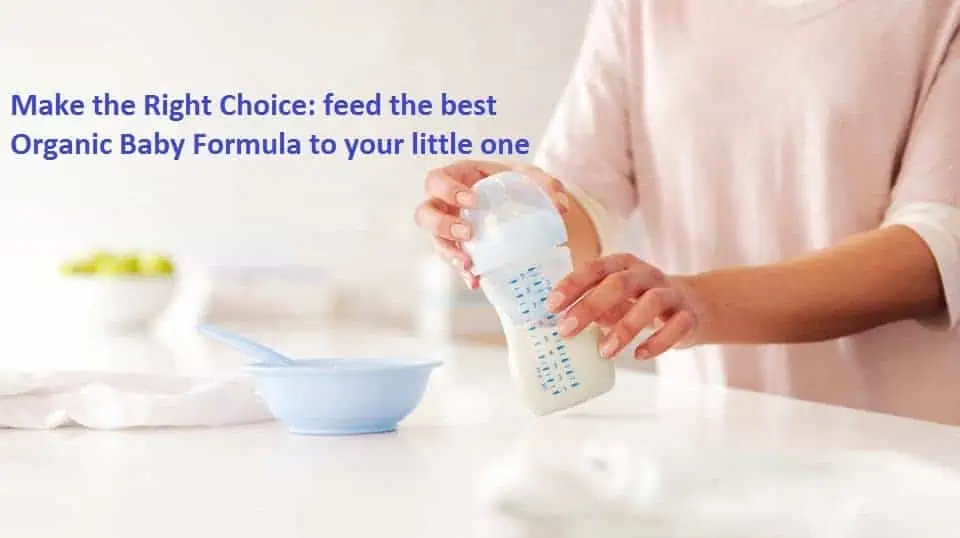Make the right choice: feed the best organic baby formula to your little one!
This post may contain affiliate links. As an Amazon Associate, I earn from qualifying purchases.
This week Adam Chip with Little Moo Organics is here to talk about baby formula. While I am a strong supporter of breastfeeding, I realize that “fed is best.” So I want to make sure mamas have the information they need to choose a formula that works best for them when breastfeeding isn’t going as planned or they need to supplement. Looking for the best organic baby formula? Adams talks about the benefits of investing in an organic high quality formula. Enjoy!
As a parent, it’s obvious you just want to give the best of all you can to your child. That’s why you’ve done so much crib research, read countless parenting books, and, of course, went above and beyond to find the most nutritious, safe, and best organic baby formula possible.
Did you know that European organic baby formulas are packed with probiotics to aid digestion, free from GMOs, and have a much lower sugar content than many American-made formulas?
Still, you would like to learn a little more about what you should look for first before you make a decision about which organic formula is right for your baby.
Consider this your quick and easy guide for you to choose the healthiest baby formula.
Related read: 10 Questions You Should Always Ask When Shopping for a Newborn
Organic Baby Formula Benefits
Providing a healthy, nutritious diet is the best thing you can do for your child — regardless of whether it comes from breastfeeding, expressed breast milk, formula, or combination feeding.
- By closely mimicking the nutritional profile of breast milk, the best organic formulas go the extra mile. This involves the use as the primary source of carbohydrates of organic lactose and a blend of organic vegetable oil containing many of the fatty acids found in breast milk.
- Additional whey is found in many organic formulas. In breast milk, this makes the protein ratio more similar to the proportions of whey and casein.
- To replicate the immunity-boosting properties of breast milk, prebiotics and probiotics are frequently added. Prebiotics such as galactooligosaccharides is very similar to human milk oligosaccharides (HMOs), whereas in breast milk, along with other types of lactic acid bacteria, probiotics such as Lactobacillus are commonly found.
- The organic formula provides essential nutrients while also making sure that no traces of harmful substances make it into the bottle of your baby. This means eliminating residue of pesticides, toxic processing agents, ingredients of chemicals, and GMOs. Organic formulas avoid unhealthy and potentially harmful ingredients such as synthetic DHA extracted from carrageenan and hexane; highly processed sweeteners such as corn syrup, glucose syrup, and brown rice syrup; and preservatives and synthetic nutrients.
Related read: 10 Must Have Baby Products for the First Year
American . vs. European formulas
Not all organic products are made equally.
As the standards for what can be included in baby formula are stricter in Europe than in the United States, there are other significant differences between American and European formulas.
- The inclusion of sucrose ( table sugar) in infant formula is prohibited by EU standards, except in small quantities in specialty formulas for premature infants or babies with allergies.
- All European formulas must be at least 30 percent lactose-based calories, which is not a requirement for U.S. formulas.
- All European formulas for babies, whether organic or not, must be free from detectable pesticide residue levels.
- Many Holle and Lebenswert formulas are certified by Demeter or Bioland, which go beyond the minimum organic standards of the EU. The Demeter certification emphasizes, for instance, a deep commitment to animal welfare, sustainability, and preservation of the ecosystem.
Related read: 18 Baby Hacks that Make Life so Much Easier
With the exception of the specialty formulas HiPP HA and HiPP Comfort containing processed whey protein for easy digestion, the organic seal of the European Union should be present in all the European formulas.
This implies that fertilizers, genetic engineering, artificial flavors, enhancers, chemical sprays are made without them.
Hopefully, this guide has provided you with helpful distinctions about what sets organic formula apart from a conventional formula, particularly organic formula from Europe. As you know, keeping your baby fed, happy, and healthy is the best thing you can do as a parent. So head over to Little Moo Organics and choose the best organic baby formulas.








